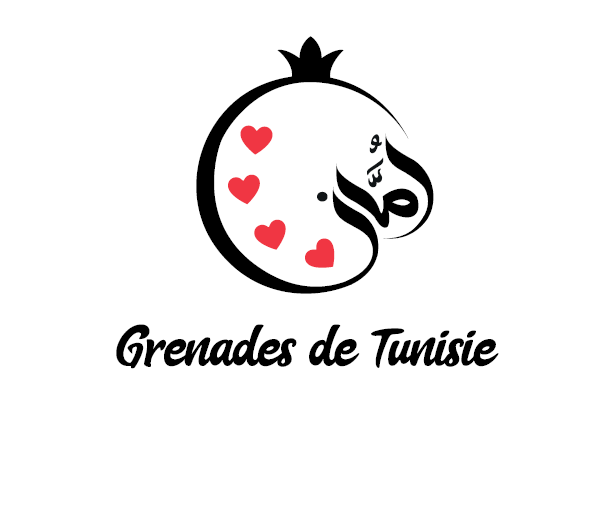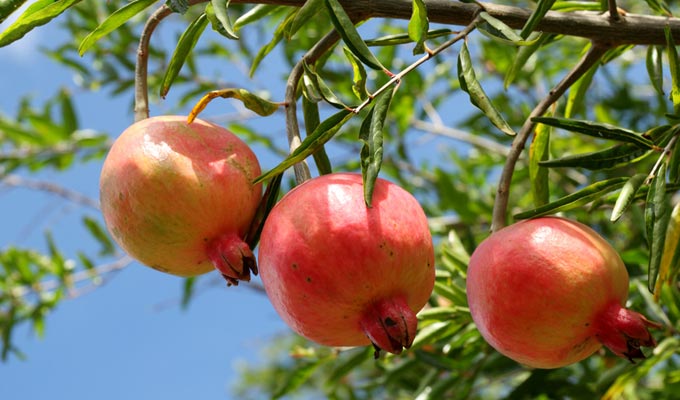Presentation of the
pomegranate value chain in Tunisia
The production of pomegranates is very ancient in Tunisia and dates at least back to the Phoenician era. Today Tunisia is ranked among the top 10 producing countries and represents 3% of world supply. National production is increasing rapidly with a growth of 30% between 2018 and 2019.
Across Tunisia, hundreds of hectares of new plantations are emerging. Indeed, the pomegranate tree easily adapts to the environment and can be grown in agricultural areas that are very difficult for other crops. More than a third of the production comes from the coastal oasis of Gabes, followed by the governorates of Beja and Kairouan.
Aujourd’hui la Tunisie est classée parmi les 10 premiers pays producteurs et représente 3% de l’offre mondial.La production nationale est en train d’augmenter rapidement avec une croissance de 30% entre 2018 et 2019. A travers toute la Tunisie, des centaines d’hectares de plantations sont entrain de voir le jour.
En effet, le grenadier est très adaptable à l’environnement et aux températures et peut être cultivé dans des zones agricoles très difficiles pour d’autres cultures. Plus d’un tiers de la production provient des oasis littorales de Gabés, suivi par le gouvernorat de Béja et Kairouan


Today the pomegranate value chain considered as a strategic sector for the Tunisian authorities, since there is a growing demand for this "super food". The pomegranate with its high levels of punicic acid is increasingly appreciated internationally for its exceptional nutritional and antioxidant qualities. One of the main drivers for the commercial success of pomegranates is indeed the positive impact on health.
The quality of Tunisian pomegranates and in particular the Gabsi variety is well recognized on international markets. Pomegranate exports are increasing and have more than doubled in recent years. Nevertheless, the export rate remains low and represents less than 10% of production. Moreover, international sales are not very diversified. Libya absorbs more than 85% of exports and is followed by Italy and France, which come far behind.
In order to position Tunisian products on international markets, the sector has to overcome many challenges in terms of productivity, logistics, quality standards and marketing.
In this context, quality labels can play an important role in the future to gain a foothold on niche markets. Currently, organic production covers only 70 hectares in Tunisia, despite the great demand for this type of certified product. Furthermore, geographical indications are not yet well established. The geographical indication for the “Gabes pomegranate” is not yet used commercially, while the geographical label for the "Testour pomegranate" still needs to be developed.
Gabes in the South and Testour in the North represent the two most famous production clusters in Tunisia. In both cities, the pomegranate is the local flagship product par excellence and has even its own annual festival. The pomegranate also plays an important role in the local gastronomy.
Another way of adding value to Tunisian pomegranates is that of processing. This superfood has become a popular ingredient for making juices, syrups, jams, vinegars and many other products. Pomegranate seed oil is also used in many dietary supplements and cosmetic products. The number of processing companies in Tunisia is currently very limited, but it is set to increase in view of the growing demand for pomegranate products on international markets.
The PAMPAT 2 project works closely with the Ministry of Agriculture and the Interprofessional Group of Fruits (GIFRUITS) to support the development of the pomegranate sector in Tunisia.
The project will encourage valorization and diversification within the pomegranate value chain in order to improve international market access.
Dans ce contexte les labels de qualité peuvent jouer un rôle important comme outils de différenciation. Pour l’instant, la production biologique couvre seulement 70 héctares en Tunisie, malgré la grande demande pour ce type de certification. D’autres labels sont également peu répandus. La seule indication géographique reconnue de la filière, celle de la «Grenade de Gabés » n’est pas utilisée en commerce, tandis que la future appellation d’origine contrôlée pour la «Grenade de Testour » n’est pas encore enregistrée. Gabés au Sud et Testour au Nord répresentent les deux pôles de production les plus connus en Tunisie. Dans les deux villes la grenade est le produit phare par excellence et dispose même de son propre festival annuel. La grenade joue également un rôle important dans la gastronomie locale.
Une autre voie de valorisation de la grenade tunisienne est celle de la transformation. Ce superfood est devenu un ingrédient prisé pour la préparation des jus, sirops, confitures et bien d’autres. L’huile de pépins de grenade entre également dans la composition de plusieurs compléments alimentaires et produits cosmétiques. Le nombre d’entreprises de transformation en Tunisie est pour l’instant très limité, mais il est appelé à augmenter en vue de la grande demande pour les produits issus de la grenade à l’international.
The PAMPAT 2 project works closely with the Ministry of Agriculture and the Interprofessional Group of Fruits (GIFRUITS) to support the development of the pomegranate sector in Tunisia. The project will encourage valorization and diversification within the pomegranate value chain in order to improve international market access.
More documents and videos related to this field are available here.
![]() Facebook page to promote the Tunisian pomegranate
Facebook page to promote the Tunisian pomegranate
![]() Directory of operators in the pomegranate's sector
Directory of operators in the pomegranate's sector
![]() Market screening for the pomegranate
Market screening for the pomegranate
![]() Pressbook for the communication campaign about the tunisian pomegranate
Pressbook for the communication campaign about the tunisian pomegranate
Project for Market Access of Typical Agrofood Products (PAMPAT Tunisia) funded by the State Secretariat for Economic Affairs of the Swiss Confederation (SECO) and implemented by the United Nations Industrial Development Organization (UNIDO) in close cooperation with the Ministry of Economy, Finances and Investment Support, the Ministry of Industry, Energy and Mining and the Ministry of Agriculture, Hydraulic Ressources and Fisheries.


